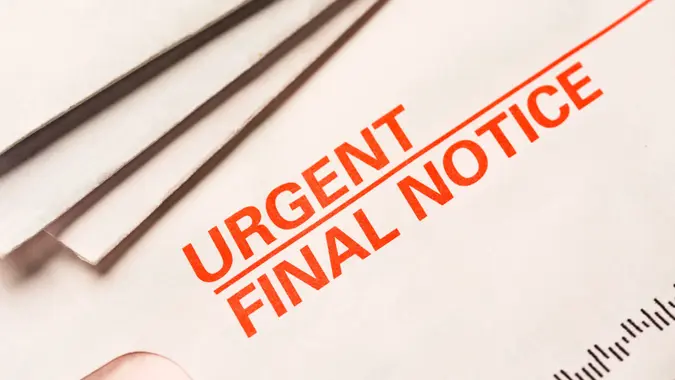Can Creditors Garnish Your Unemployment Benefits?

Commitment to Our Readers
GOBankingRates' editorial team is committed to bringing you unbiased reviews and information. We use data-driven methodologies to evaluate financial products and services - our reviews and ratings are not influenced by advertisers. You can read more about our editorial guidelines and our products and services review methodology.

20 Years
Helping You Live Richer

Reviewed
by Experts

Trusted by
Millions of Readers
If you owe a debt, such as long overdue tax debts or student loan payments, the government can withhold part of your paycheck to repay the amount owed, according to the U.S. Department of Labor (DOL).
Having your wages garnished isn’t a pleasant experience, especially if you’re already on unemployment benefits and struggling to make ends meet.
Fortunately, most creditors need to obtain a court order before they can start garnishing your wages or benefits, with the exceptions of child support, income taxes or student loans.
What Is Wage Garnishment?
To cover unpaid debts, a court can order a judgment that requires your employer to withhold a portion of your paycheck until the debt is paid off. This process is called garnishment.
According to the DOL, there are limits to how much a creditor can garnish from your wages or benefits and there are laws that help you maintain a minimum amount in your bank account even when your wages are being garnished.
Can Your Unemployment Benefits Be Garnished?
In most cases, an official court order is needed to garnish wages or benefits. That means that creditors, such as credit card agencies or other commercial lenders will need a garnishment order to garnish wages or benefits.
However, the government garnishes certain types of unpaid debts, including tax debt, student loan debt and child support or alimony. Ordinary garnishments that don’t fall into these categories typically can’t exceed 25% of an employee’s weekly disposable earnings.
Tax Debt
If you owe unpaid taxes, your employer may receive a court order to withhold a percentage of your paycheck. The exact amount of garnished wages may vary, depending on your situation and whether you owe state or federal taxes.
Student Loan Debt
If you default on your federal student loans, agencies such as the Internal Revenue Service (IRS), the Department of Education (DOE) or contracted collection agencies can garnish up to 15% of your disposable earnings without a court order.
Child Support or Alimony
Child support or alimony can be garnished at a much higher rate of up to 60% of a worker’s disposable earnings. If you owe child support but are also supporting another spouse or child, the ceiling is lowered to 50%. Late payments will accrue additional penalties.
How To Protect Your Unemployment Benefits
If wage garnishment is causing you financial difficulties or you want to protect your unemployment benefits from being garnished, then it’s important to understand your options.
According to FindLaw, here are some possible actions to consider when dealing with wage garnishment:
- File for bankruptcy. This may seem like an extreme action to take, but filing for bankruptcy pauses or stops wage garnishment in most cases. When you file for bankruptcy, the court issues an automatic stay that prevents collectors from pursuing your debts. However, bankruptcy doesn’t completely halt all types of wage garnishment. Child support, alimony and student loan debt may still be garnished from your unemployment benefits during the automatic stay.
- Claim economic hardship. If you can prove to the court that you aren’t able to cover your basic living expenses due to wage garnishment, it may be possible to limit the amount of garnishment on your unemployment benefits.
- Check if you qualify for an exemption. Some states allow for exemptions from wage garnishment if you meet certain criteria, such as requiring money for medical assistance. If you qualify, you may be able to protect your unemployment benefits from exemption.
- Make sure your creditor isn’t violating the law. Federal laws state that ordinary garnishments must be either 25% of your disposable earnings or the difference between your disposable earnings and 30 times the federal minimum wage. If your creditor is garnishing a larger portion of your wages, they may be violating state or federal laws.
- Go for debt counseling. There are various non-profit credit counseling services that might be able to help you negotiate with creditors to avoid wage garnishment. You can also look for state-based legal aid programs for low-income consumers or consult a lawyer who specializes in debt.
Consider All Your Options
Paying off unpaid debt can be difficult and it only gets harder if you’re not earning a regular paycheck. So, it can be discouraging to learn that your unemployment benefits can also be garnished if you owe certain types of debt such as unpaid taxes, student loans, child support or spousal support.
If you’re struggling to see a way out of debt, know your rights and consider all your options. Loan rehabilitation programs can help you figure out a reasonable repayment plan or you may be able to file for an exemption for certain types of debt. As a last resort, you could file for bankruptcy to temporarily or permanently stop garnishment for debts other than child support and alimony.
 Written by
Written by  Edited by
Edited by 

























